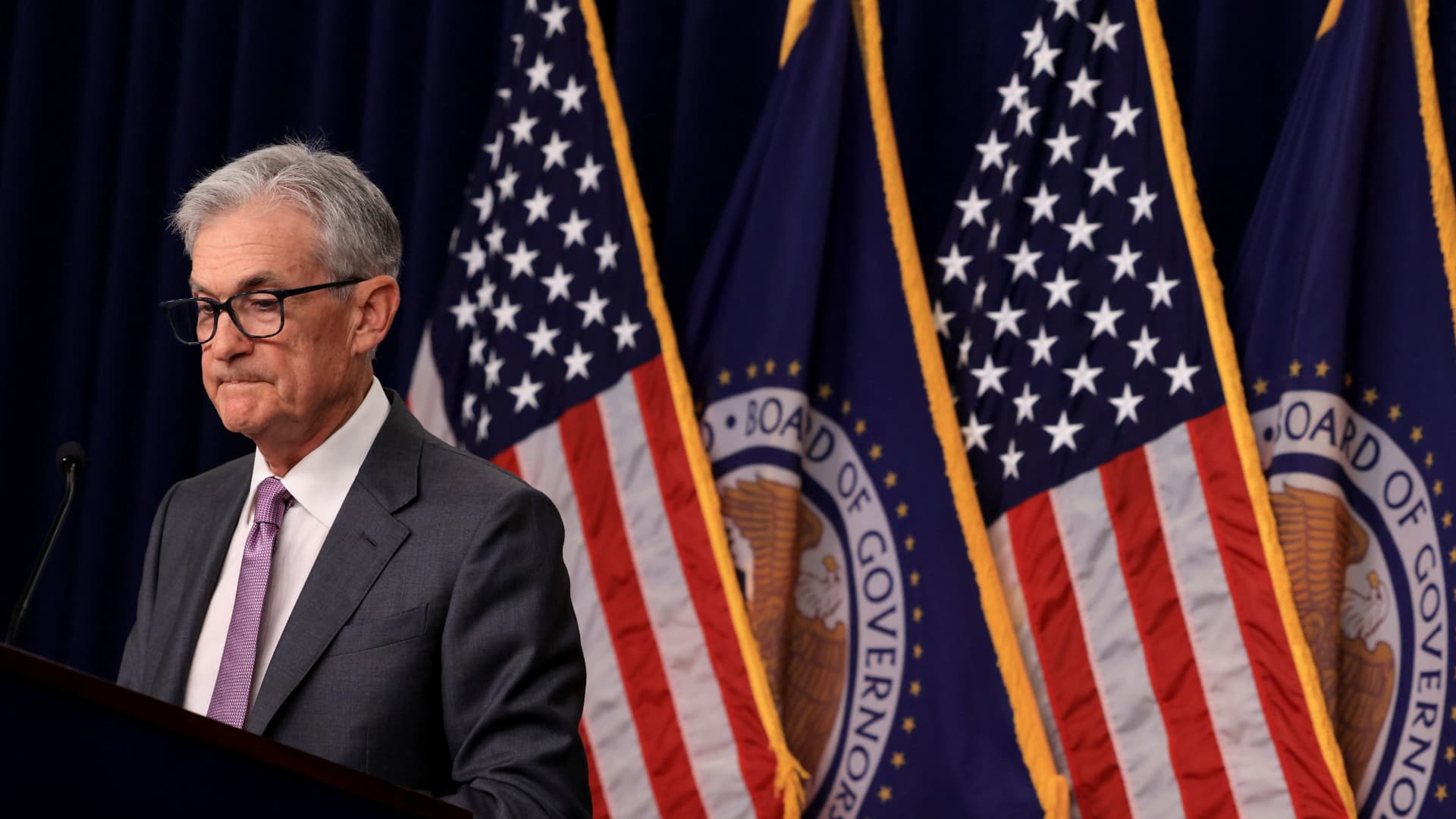U.S. Federal Reserve Chair Jerome Powell holds a press conference following a two-day meeting of the Federal Open Market Committee on interest rate policy in Washington, U.S., July 31, 2024.
Kevin Mohatt | Reuters
For all the attention being paid to Federal Reserve Chair Jerome Powell’s policy speech Friday, the chances of it containing any startling news seem remote.
After all, the market has its mind made up: The Fed is going to start cutting rates in September — and likely will keep cutting through the end of the year and into 2025.
While there are still some questions about the magnitude and frequency of the reductions, Powell is now left to deliver a brief review of where things have been, and give some limited guidance about what’s ahead.
“Stop me if you’ve heard this before: They’re still data dependent,” said Lou Crandall, a former Fed official and now chief economist at Wrightson-ICAP, a dealer-broker where he has worked for more than 40 years. He expects Powell to be “directionally unambiguous, but specifics about how fast and exactly when will depend on the data between now and the meeting. Little doubt that they will start cutting in September.”
The speech will be delivered at 10 a.m. ET from the Fed’s annual conclave of global central bankers in Jackson Hole, Wyoming. The conference is titled “Reassessing the Effectiveness and Transmission of Monetary Policy” and runs through Saturday.
If there were any doubts about the Fed’s intentions to enact at least a quarter percentage point cut at the Sept. 17-18 open market committee meeting, they were put to rest Wednesday. Minutes from the July session showed a “vast majority” of members in favor of a September cut, barring any surprises.
Philadelphia Fed President Patrick Harker drove the point home even further Thursday when he told CNBC that in “September we need to start a process of moving rates down.”
A question of guidance
A main question is whether the first reduction in more than four years is a quarter point or half point, a topic on which Harker would not commit. Markets are betting on a quarter but leaving open about a 1-in-4 chance for a half, according to the CME Group’s FedWatch.
A half-point move likely would require a substantial deterioration in economic data between now and then, and specifically another weak nonfarm payrolls report in two weeks.
“Even though I think the Fed’s base case is they’ll move a quarter, and my base case is they’ll move a quarter, I don’t think they’ll feel the need to provide any guidance around that this far out,” Crandall said.
In previous years, Powell has used Jackson Hole speech to outline broad policy initiatives and to provide clues about the future of policy.
At his first appearance, in 2018, he outlined his views on the interest and unemployment rates considered “neutral” or stable. A year later, he indicated rate cuts were coming. In a speech delivered amid racial protests in 2020, Powell unveiled a new approach that would allow inflation to run hotter than usual, without rate hikes, in the interest of promoting a more inclusive jobs market. That “flexible average inflation targeting,” though, would precede a period of surging prices — leaving Powell in the ensuing three years to navigate a delicate minefield of policy.
This time around, the task will be to confirm the market’s expectations while also indicating his impressions of the economy and in particular the moderating of inflation pressures and some concerns over the labor market.
“To us, the key will be Chair Powell’s tone, which we expect to lean dovish” or towards lower rates, Jack Janasiewicz, lead portfolio strategist at Natixis Investment Managers Solutions, said in written commentary. “Simply put, inflation continues to trend towards the 2% target seemingly at a rate exceeding consensus. Combine this with signs that the labor market is softening and one gets the sense that there is little need to retain a hawkish stance.”
Listening to markets
The Fed has held its key overnight borrowing rate in place for the past 13 months following a series of aggressive hikes. Markets have mostly done well under the higher-rate regime but rebelled briefly after the July meeting following signs of a deteriorating labor picture and a weakening manufacturing sector.
Powell is expected to give at least a nod to some economic headwinds, as well as the progress the Fed has made in its inflation fight.
“We expect Powell to express a bit more confidence in the inflation outlook and to put a bit more emphasis on downside risks in the labor market than in his press conference after the July FOMC meeting, in light of the data released since then,” Goldman Sachs economist David Mericle said in a recent note.
Goldman is about at the consensus of market expectations: rate cuts at each of the next three meetings, followed by more easing in 2024 that eventually will shave about 2 percentage points off the fed funds rate — a policy path that will be teed up, in very general terms, by Powell in Jackson Hole.
Fed chairs profess to not be sensitive to financial market movements, but Powell no doubt saw the reaction after the July meeting and will want to assuage fears that the central bank will keep waiting before it begins to ease.
“Powell is inclined to support the stock market,” said Komal Sr-Kumar, head of Sri-Kumar Global Strategies. “Time and again, he has indicated rates are going to come down. They haven’t come down, but this time around, he’s going to do it.”

 Blog Post1 week ago
Blog Post1 week ago
 Economics1 week ago
Economics1 week ago
 Finance1 week ago
Finance1 week ago
 Economics1 week ago
Economics1 week ago
 Economics1 week ago
Economics1 week ago
 Personal Finance1 week ago
Personal Finance1 week ago
 Accounting1 week ago
Accounting1 week ago
 Economics1 week ago
Economics1 week ago









